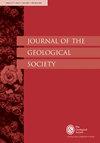Water quality of the southern Tibetan Plateau: hydrogeochemistry assessment of the Yarlungzangbo River
IF 3
3区 地球科学
Q2 GEOSCIENCES, MULTIDISCIPLINARY
引用次数: 0
Abstract
The Yarlungzngbo River (YR) is the largest river system draining the northern slopes of the Himalayan ranges on the southern Tibetan Plateau and is critical to the water supply of the people downstream. In this paper the chemical composition of the YR and its major tributaries (Nianchu River and Lhasa River) are studied. Water samples (n=165) were collected and analyzed for major ions and trace elements. Multivariable analysis shows that geology and climate are the major explanatory variables for the spatio-temporal variation in water chemistry in this river system. Water chemistry is mainly controlled by carbonate weathering, with Ca 2+ and HCO 3 - being the dominant ions. Furthermore, hot spring discharge rich in Na + , Cl - , SO 4 2- and Li is another potential ion source affecting river water chemistry, resulting in higher solute concentrations in the source region and upstream, TDS reached 176.9 mg/L. Levels of most trace elements were generally found to be low. However, elevated As (16.6 μg/L) and Sb concentration (2.08 μg/L) in the headwaters and additions from untreated wastewater were evident, which exceeded the national standard of China (GB) and the World Health Organization (WHO) drinking water guide, posing a risk to human livelihood in the local and surrounding areas. Supplementary material: https://doi.org/10.6084/m9.figshare.c.6850720青藏高原南部水质:雅鲁藏布江水文地球化学评价
雅鲁藏布江(YR)是青藏高原南部喜马拉雅山脉北坡最大的水系,对下游人民的供水至关重要。本文研究了青藏高原及其主要支流念楚河和拉萨河的化学成分。收集了165个水样,分析了主要离子和微量元素。多变量分析表明,地质和气候是该水系水化学时空变化的主要解释变量。水化学主要受碳酸盐风化控制,ca2 +和hco3 -是主导离子。此外,富含Na +、Cl -、so4.2 -和Li的温泉排放是影响河流水化学的另一个潜在离子源,导致源区和上游溶质浓度较高,TDS达到176.9 mg/L。大多数微量元素的含量普遍偏低。然而,水源和未经处理的废水中砷和锑的浓度均明显升高(分别为16.6 μg/L和2.08 μg/L),超过了中国国家饮用水标准(GB)和世界卫生组织(WHO)饮用水指南,对当地及周边地区的人类生活构成了威胁。补充资料:https://doi.org/10.6084/m9.figshare.c.6850720
本文章由计算机程序翻译,如有差异,请以英文原文为准。
求助全文
约1分钟内获得全文
求助全文
来源期刊

Journal of the Geological Society
地学-地球科学综合
CiteScore
6.00
自引率
3.70%
发文量
68
审稿时长
6-12 weeks
期刊介绍:
Journal of the Geological Society (JGS) is owned and published by the Geological Society of London.
JGS publishes topical, high-quality recent research across the full range of Earth Sciences. Papers are interdisciplinary in nature and emphasize the development of an understanding of fundamental geological processes. Broad interest articles that refer to regional studies, but which extend beyond their geographical context are also welcomed.
Each year JGS presents the ‘JGS Early Career Award'' for papers published in the journal, which rewards the writing of well-written, exciting papers from early career geologists.
The journal publishes research and invited review articles, discussion papers and thematic sets.
 求助内容:
求助内容: 应助结果提醒方式:
应助结果提醒方式:


